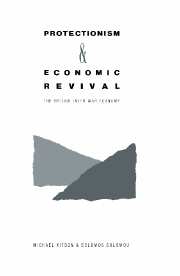Book contents
- Frontmatter
- Contents
- List of figures
- List of tables
- Preface
- Introduction
- 1 British interwar economic growth in an historical perspective
- 2 The impact of protectionism on economic growth: theoretical issues
- 3 Quantitative studies of the impact of the 1932 General Tariff
- 4 A macroeconomic analysis of the impact of the 1932 General Tariff
- 5 Industrial performance and trade policy: a disaggregated analysis
- 6 The 1930s economic revival: an overview
- Conclusion
- Notes
- List of references
- Index
2 - The impact of protectionism on economic growth: theoretical issues
Published online by Cambridge University Press: 05 January 2012
- Frontmatter
- Contents
- List of figures
- List of tables
- Preface
- Introduction
- 1 British interwar economic growth in an historical perspective
- 2 The impact of protectionism on economic growth: theoretical issues
- 3 Quantitative studies of the impact of the 1932 General Tariff
- 4 A macroeconomic analysis of the impact of the 1932 General Tariff
- 5 Industrial performance and trade policy: a disaggregated analysis
- 6 The 1930s economic revival: an overview
- Conclusion
- Notes
- List of references
- Index
Summary
Introduction
Although our primary concern in this book is with the empirical evidence on the impact of British tariffs in the 1930s, historical situations cannot be analysed without explicit or implicit theoretical frameworks. Much of the economic history on the impact of tariffs in the 1930s has been written within perspectives that assume the validity of the free trade doctrine (Capie, 1978 and 1983; Richardson, 1967). In this chapter we review the theoretical literature on the impact of protection with the aim of showing that, in a wide variety of situations, protection may have favourable effects on real variables such as output, employment and economic growth. Since trade theory literature divides into micro and macro studies, we will use this demarcation line as the basis of our review.
Microeconomic aspects
The classical argument for free trade
The traditional argument is expressed in terms of free trade allowing countries to specialise in the production of these goods in which they have comparative advantage. Thus, by enlarging consumption possibilities free trade increases the welfare of individual countries and the world system as a whole. The imposition of tariffs disturbs the optimal allocation of resources, creates a ‘dead-weight loss’ on the country imposing tariffs and disrupts the equilibrium of the world system by creating distortions in the price mechanism. This classical argument for free trade is based on three major assumptions, each of which is questionable.
- Type
- Chapter
- Information
- Protectionism and Economic RevivalThe British Inter-war Economy, pp. 22 - 30Publisher: Cambridge University PressPrint publication year: 1990



